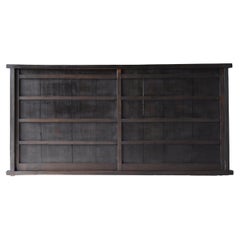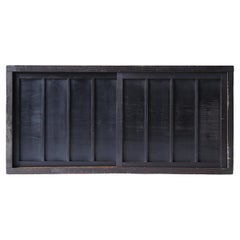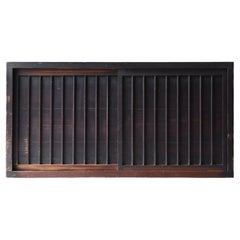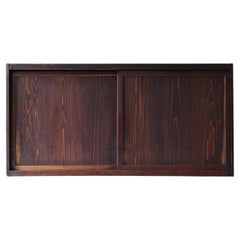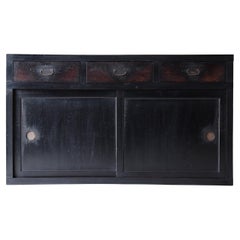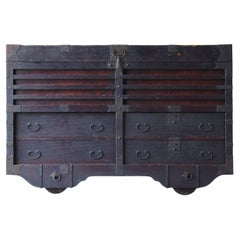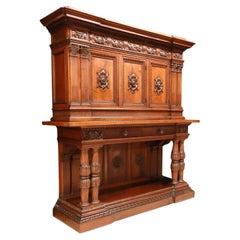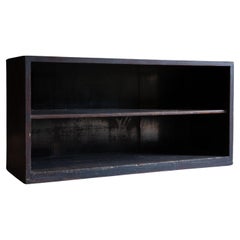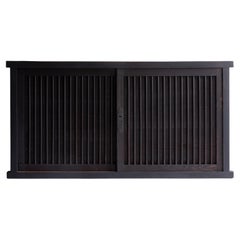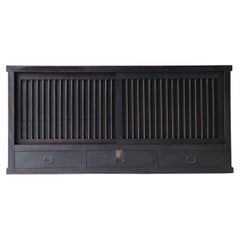Cedar Sideboards
to
7
Height
to
Width
to
Depth
to
13
2
17
6
6
6
1
5
11
6
5
1,151
6,979
2,747
1,623
1,384
10
9
8
8
8
23
17
17
2
2
1
1
1
Material: Cedar
Japanese Antique Large Black Tansu 1860s-1900s / Sideboard Cabinet Wabi Sabi
Located in Chōsei District Nagara, JP
This is an old large black tansu chest made in Japan. Crafted during the Meiji period (1860s–1900s), it is made from cedar wood, a material known for...
Category
Early 20th Century Japanese Meiji Cedar Sideboards
Materials
Cedar
Japanese Antique Black Tansu 1860s-1900s / Sideboard Storage Cabinet Wabisabi
Located in Chōsei District Nagara, JP
This is an antique Japanese black tansu chest, crafted in the Meiji period (1860s–1900s). It is made from sugi (cedar) wood. Its understated and unem...
Category
Early 20th Century Japanese Meiji Cedar Sideboards
Materials
Cedar
Japanese Antique Large Black Tansu 1860s-1900s / Sideboard Cabinet Wabisabi
Located in Chōsei District Nagara, JP
This is a large, old Japanese black chest (Tansu) made in the Meiji period (1860s–1900s). It is crafted from sugi (Japanese cedar), a traditional material in Japan. Over the years, t...
Category
Early 20th Century Japanese Meiji Cedar Sideboards
Materials
Cedar
Japanese Antique Large Tansu 1860s-1900s / Sideboard Cabinet Storage Wabi Sabi
Located in Chōsei District Nagara, JP
This is a large antique Tansu chest from Japan, crafted during the Meiji period (1860s–1900s). It is made of Japanese cedar, whose surface has gained depth and character over time, c...
Category
Early 20th Century Japanese Meiji Cedar Sideboards
Materials
Cedar
Japanese Antique Large Black Sideboard 1860s-1900s / Tansu Wabisabi
Located in Chōsei District Nagara, JP
This is an old, large sideboard made in Japan.
The furniture was made during the Meiji period (1860s-1900s) and has a deep black paint throughout, giving it a stately appearance.
The...
Category
Early 20th Century Japanese Meiji Cedar Sideboards
Materials
Iron
$2,400 Sale Price
46% Off
Japanese Antique Large Kuruma Tansu 1800s-1860s / Cabinet Sideboard Wabi Sabi
Located in Chōsei District Nagara, JP
This is an old, large, Japanese-made Kuruma-Tansu.
Made in the Edo period (1800s-1860s), it is a powerful and dignified piece, the culmination of the skills and aesthetic sense of th...
Category
Late 19th Century Japanese Edo Antique Cedar Sideboards
Materials
Iron
$3,600 Sale Price
28% Off
Large Art Deco Sideboard / Credenza – Black Lacquer, Brass, 1940s
Located in Lisbon, PT
Striking 1940s Art Deco sideboard credenza featuring an elegant black lacquer finish and generous proportions. Measuring 78.75 inches (200 cm) wide, this substantial piece offers bot...
Category
20th Century French Art Deco Cedar Sideboards
Materials
Brass
$17,036 Sale Price
20% Off
A Large Early Meiji Period Wabi Sabi Japanese Tansu/Sideboard
Located in London, GB
A large early Meiji period Japanese tansu/sideboard
A really nice mid/late 19th C. Japanese sideboard/tansu.
It was likely to be used as a coun...
Category
19th Century Japanese Meiji Antique Cedar Sideboards
Materials
Cedar
Large Edo Period Japanese Tansu/Sideboard Wabi Sabi
Located in London, GB
A large heavily patinated Edo period Tansu/sideboard.
Constructed in cedar & elm with two sliding doors & three internal drawers.
Original forged ir...
Category
Mid-19th Century Japanese Antique Cedar Sideboards
Materials
Cedar
Art Deco Jules Leleu Sideboard, Three Doors Credenza, 20th Century
By Jules Leleu
Located in Lisbon, PT
Large 1940s Art Deco Jules Leleu style sideboard holds an impressive 78.75 in (200 cm) in width in a large buffet style, with nickeled brass hardware providing perfect support for th...
Category
20th Century French Art Deco Cedar Sideboards
Materials
Brass
$6,170 Sale Price
37% Off
Modern Low Clair Credenza By Corinna Warm Two-Tone Panels Black Ebonized Wood
By Corinna Warm, WARM
Located in Santa Monica, CA
The Clair collection of high-end sideboards and credenzas features a three-dimensional, faceted front panel in the case of the low Clair credenza, beaut...
Category
2010s American Modern Cedar Sideboards
Materials
Stainless Steel
Jules Leleu Attributed Art Deco Sideboard, Walnut & Off White Lacquer, Brass
By Jules Leleu
Located in Lisbon, PT
Exceptional Art Deco sideboard attributed to Jules Leleu, one of the most influential French designers of the 20th century. This elegant piece has been professionally refinished in a...
Category
20th Century French Art Deco Cedar Sideboards
Materials
Brass
$17,480 Sale Price
20% Off
Jules Leleu Attributed Art Deco Sideboard, Walnut & Black Lacquer, Brass
By Jules Leleu
Located in Lisbon, PT
Exceptional Art Deco sideboard attributed to Jules Leleu, one of the most influential French designers of the 20th century. This elegant piece has been professionally refinished in a...
Category
20th Century French Art Deco Cedar Sideboards
Materials
Brass
$17,435 Sale Price
20% Off
Hand Carved Sideboard in Cedar Wood with Brass and Marble Details
Located in Guadalajara, Jal.
This credenza is a piece to touch, the ideal accent for a space with a lot of personality. Its fronts carved by hand in solid cedar wood with a black finish, generate a sensory exper...
Category
2010s Mexican Modern Cedar Sideboards
Materials
Marble, Brass
19th Century Chinese Ancient Cedar Sideboard
Located in San Marino, CA
19th century Chinese Ancient Cedar sideboard. Two drawer, two door cabinet in spectacular ancient cedar from Hebei with one of a kind metal handles. Th...
Category
19th Century Antique Cedar Sideboards
Materials
Cedar
Cassone Venetian 16thc Renaissance Cedar Original Stand Neptune Armorial Unicorn
Located in BUNGAY, SUFFOLK
A large, museum-quality, late-16th century, cedar, Venetian, cassone on its original stand ; the sea creature ornament probably drawn from De la Cosmographie Universelle, livre III, engraving 1550-1568
• This is the only, known, cassone of this type retaining its original stand.
• The collection in Italy that it originally came from was a palazzo that it had reputedly been in for generations of the same family and this most likely why the stand has survived.
• The decoration is very unusual, and delightful in the array of sea creatures depicted. The connection of the region with the sea is very strong.
• The inner lid is very practical and can be used for display or serving. The interior offers masses of storage space which is particularly suitable for textiles being cedar which repels moths.
• The cassone is a beautiful, rich colour and has developed a lustrous patina.
• The cassone is Illustrated & discussed in discussed in ‘Woods in British Furniture Making’, (Bowett) c13
Provenance: Private collection, Mayorca. Private collection, Italy
Related to: Cassone in V&A collection, no 4886-1858
Width 177 cm., 70 in., Height 87 cm., 34 ½ in. Depth 68 cm. 26 ½ in.
With lid open 155 cm., 61 in
“Late 16th and 17th century, London inventories confirm that cypress wood chests were relatively common in prosperous households. In 1598 there was a cypress chest in the hall of John Mason, a vintner, valued at 50 shillings. It was the most expensive piece of furniture in the house. Similarly there was a ‘fair cypress chest’ in the great chamber of Adrian Moore, haberdasher, in 1618, and a cypress chest worth £ 9 in the hall of Thomas Willis, a clotherworker in 1630. The chests were sometimes described as ‘great’ or ‘small’ but not otherwise described – presumably they were familiar to the compilers of the inventories. They were placed in halls, chambers and parlours, places where they would have been on prominent view. It is noteworthy that only the chests were imported and not, apparently, the wood. “ (p282, Cypress, Woods in British Furniture making)
The decoration is very unusual, and delightful in the array of sea creatures depicted. The connection of the region with the sea is very strong. I have never seen one of these chests on its original stand. The collection in Italy that it came from was a palazzo that it had reputedly been in for generations of the same family and this most likely why the stand has survived. In practical terms, the stand makes the chest a comfortable height to use. The exterior of the chest is a beautiful, mellow colour and has developed a lustrous patina.
The top comprises three planks faced with a shallow, cleated, moulded edge nailed on. The front retains its original hasp and lockplate and, as is commonly found, the lock has been removed but, unusually the original ring hinges have survived. The top opens to reveal an inner lid with ring hinges and a brass ring, revealing a large open storage compartment below, the bottom lined with an old fabric. The underside of the lid retains its original penwork and pierced decoration. The central panel depicts sea creatures, sharks, flatfish, monster fish, sea horses, Neptune and mermaids, probably drawn from De la Cosmographie Universelle, livre III, engraving 1550-1568. The panels either side depicting a crown, the sun and unicorns amongst stylised floral sprays. The surrounding naive penwork border features repeats of three naked ladies in the sea, a man wearing an animal mask with two dogs in a forest and a huntsman with two dogs. The floor of the inside of the cassone is upholstered in an 18th century red and yellow striped woven textile the colours of the Catalan flag. The front is decorated with pierced, silhouettes of beasts, trees and figures. The sides are plain with iron carrying handles. On its original stand, with similar decoration, and bearing a cartouche which would have been decorated with the arms of its original owner. Italian, last quarter of the 16th century.
Condition Report : Old repair to bottom left moulding of top. Some hairline cracks to top. The hasp, lockplate and ring hinges are original, the lock has been removed. Handles probably 18th century. The inner lid was probably added in the 18th century and supporting mechanism in the 19th century. Exceptional original, lustrous colour and patina.
Measures: Width 177 cm. 70 in., height 87 cm. 34 ½ in., depth 68 cm. 26 ½ in.
The cassone was the principal piece of furniture in 16th century, Italy. These chests were made as bridal gifts for nobles and aristocrats from cedar specifically for storing their much prized and valued hangings, clothing and linens, as the wood repels moths and the sweet fragrance delicately scents fabrics. Consquently the cassone, as in this example might be decorated with the family coat of arms or with depictions of virtue and edifying episodes from the Bible. A young woman could not be allowed to enter marriage without some instruction. Later, many cassoni were taken apart so that the decorated front panel could be hung as a painting. The stand of this cassone has a cartouche that would have contained a painted coat of arms in the centre which shows that it was conceived for a noble family. Such cypress or cedar chests, incised in bas relief and pyrographically engraved, have long been associated with Venice and typically have a naïve decoration on the exterior.
Literature:
The 'cypress chests' containing 'arras, counterpoints, costely apparel, tents, and canopies, fine linen, Turkey cushions...
Category
16th Century Italian Renaissance Antique Cedar Sideboards
Materials
Cedar
French Art Deco Credenza, Off-White Lacquer & Copper, 1940s
Located in Lisbon, PT
Impressive French Art Deco credenza dating from the 1940s, featuring a refined off-white lacquer finish and elegant copper-plated brass hardware. Measuring 78.75 inches (200 cm) wide...
Category
20th Century French Art Deco Cedar Sideboards
Materials
Brass
$8,931 Sale Price
20% Off
French Art Deco Credenza Sideboard with Mirror – Black Lacquer, 20th Century
Located in Lisbon, PT
Elegant French Art Deco credenza from the 20th century, professionally refinished in refined black lacquer and accented with sleek chrome hardware. This distinctive sideboard feature...
Category
20th Century French Art Deco Cedar Sideboards
Materials
Marble, Brass
Louis XVI-Style Cedar & Gold Sideboard
Located in Milan, IT
A cabinetmaking gem indulging in Baroque details, this sideboard is a fine example of Louis XVI-style designs. The shaped structure in first-rate cedar is decorated with 24K gold-pla...
Category
2010s Italian Modern Cedar Sideboards
Materials
Gold Plate, Bronze
$75,785 / item
Hand Carved Credenza in Cedar Wood, Sideboard with Brass and Marble Details
Located in Guadalajara, Jal.
This credenza is a piece to touch, the ideal accent for a space with a lot of personality.
Its fronts carved by hand in solid cedar wood with a black finish, generate a sensory e...
Category
2010s Mexican Modern Cedar Sideboards
Materials
Marble, Brass
Antique Hand-Carved Swat Chest from Pakistan
Located in Prato, IT
Swat, Pakistan
Period: mid-19th century
Entirely hand carved
Interlocking structure no gluing
Very good condition
Measurements: cm W113 x D59 x H121.5 cm.
Category
Mid-19th Century Pakistani Antique Cedar Sideboards
Materials
Cedar
Corniac Console without Shelf by LK Edition
Located in Geneve, CH
Corniac console without shelf by LK Edition
Dimensions: 300 x 44 x H 83 cm
Materials: Tinted and brushed cedar and lacquer.
Also available with a built-in shelf.
It is with ...
Category
2010s French Modern Cedar Sideboards
Materials
Cedar, Lacquer
$15,444 / item
Corniac Console with Shelf by LK Edition
Located in Geneve, CH
Corniac console with Shelf by LK Edition
Dimensions: 300 x 44 x H 83 cm
Materials: Tinted and brushed cedar and lacquer.
Also available without...
Category
2010s French Modern Cedar Sideboards
Materials
Cedar, Lacquer
$17,528 / item
Related Items
Early 1900s Antique Italian Renaissance Revival, Walnut, Foliate Sideboard!
Located in Austin, TX
Gorgeous Early 1900s Antique Italian Renaissance Revival, Walnut, Foliate Sideboard!
Antique Sideboard, Italian Renaissance Revival, Walnut, Foliate, Early 1900's, 20th Century!
Th...
Category
Early 20th Century Italian Renaissance Revival Cedar Sideboards
Materials
Wood
$3,599 Sale Price
24% Off
H 89 in W 84 in D 25 in
1870s-1900s Japanese antique Mizuya tansu chest sideboard Wabi sabi primitive
Located in 常陸大宮市, JP
New finds from Tohoku area, Japan.
This single tier Mizuya tansu is made from premium quality, reddish Sugi Cedar. The product of circa 1870s to 1900s (Meiji to early Taisho period)...
Category
Late 19th Century Japanese Meiji Antique Cedar Sideboards
Materials
Wood, Cedar
$2,150
H 24.69 in W 50.01 in D 16.34 in
Japanese Antique Wheeled Storage Chest / Sideboard Tansu / 1868-1912s Wabi-sabi
Located in Iwate-gun Shizukuishi-cho, Iwate Prefecture
This storage furniture, known as a "kurumanagamochi" (cartridge), has been used in Japan since ancient times.
Made primarily from pine and cedar, it was commonly used in the Tohoku r...
Category
19th Century Japanese Meiji Antique Cedar Sideboards
Materials
Iron
$2,500
H 34.26 in W 52.37 in D 24.41 in
Japanese Antique Drawer 1860s-1900s / Storage Tansu Wabisabi
Located in Sammu-shi, Chiba
This is a very old Japanese small drawer storage.
The furniture is from the Meiji period (1860s-1900s).
This is a "Shonai chest" chest made in the Tohoku region of Japan.
It is chara...
Category
Early 20th Century Japanese Meiji Cedar Sideboards
Materials
Cedar
Japanese Antique BK Tansu 1860s-1900s ③ / Cabinet Sideboard Wabi Sabi
Located in Sammu-shi, Chiba
This chest of drawers is one of a set of three used in the same old Japanese house.
Judging from its current condition, it appears to be quite old. It is in all original condition.
...
Category
Early 20th Century Japanese Edo Cedar Sideboards
Materials
Cedar
$2,300
H 34.65 in W 34.45 in D 18.12 in
Japanese Antique Chests of Drawers 1800s-1860s/Safe Storage Cabinet Wabisabi
Located in Sammu-shi, Chiba
It is an old Japanese drawer.
It is an item from the Edo period (1800s-1860s).
It has a keyed door so that it can also be used as a safe. Both metal fittings are attached with very ...
Category
Late 19th Century Japanese Edo Antique Cedar Sideboards
Materials
Cedar
$1,200
H 20.08 in W 29.53 in D 14.18 in
1860s-80s Japanese antique wabi sabi Black Urushi mid Tansu chest of drawers
Located in 常陸大宮市, JP
From Kanto or Tohoku area, Japan.
This mid-size, black Urushi lacquered Tansu chest of drawers is a product of late Edo to early Meiji era (circa 1860s-1880s) , estimate from the st...
Category
Late 19th Century Japanese Edo Antique Cedar Sideboards
Materials
Wood
$1,910
H 25.79 in W 30.91 in D 15.67 in
Japanese Antique Wabisabi Drawer 1860s-1900s / Cabinet Storage Tansu Mingei
Located in Sammu-shi, Chiba
It is a very old Japanese drawer.
It was built from the late Edo period to the Meiji period (1820-1912).
It is furniture that was used in shops rather than being used in ordinary hom...
Category
19th Century Japanese Meiji Antique Cedar Sideboards
Materials
Cedar
$750
H 9.45 in W 10.63 in D 7.09 in
1860s-1910s Meiji Japanese antique wabi sabi Urushi mid Tansu chest of drawers
Located in 常陸大宮市, JP
From Tohoku area, Japan.
This mid-size, dark reddish brown Urushi lacquered Tansu chest of drawers is a product of Meiji period (1868-1912) , estimate from the style & conditions. M...
Category
Late 19th Century Japanese Meiji Antique Cedar Sideboards
Materials
Wood, Cedar
$1,400
H 10.16 in W 35.83 in D 16.34 in
Japanese Antique BK Drawer 1860s-1900s / Storage Tansu Wabisabi
Located in Sammu-shi, Chiba
Very old Japanese small drawer storage.
The furniture is from the Meiji period (1860s-1900s).
It is made of cedar wood and pine.
The handles are made of iron.
This is almost in its o...
Category
Early 20th Century Japanese Meiji Cedar Sideboards
Materials
Cedar, Pine
$1,600
H 26.38 in W 23.43 in D 15.95 in
Japanese Antique Wabi Sabi Small Drawer 1860s-1900s
Located in Sammu-shi, Chiba
Very old Japanese small drawer.
This furniture is from the Meiji period (1860s-1900s).
It is made of cedar wood.
The round handles are made of iron.
These drawers are tasteful, rust...
Category
Early 20th Century Japanese Meiji Cedar Sideboards
Materials
Cedar
1840s-1860s Edo Japanese antique black wooden box chest with lid, wabi sabi
Located in 常陸大宮市, JP
Japanese antique wooden cabinet box manufactured circa 1840s-1860s (late Edo period) estimate from the style & conditions.
Made with traditional wood joinery without metal fastener....
Category
Late 19th Century Japanese Edo Antique Cedar Sideboards
Materials
Wood
$1,590
H 19.1 in W 30.71 in D 17.52 in
Previously Available Items
Japanese Antique Large Black Tansu 1860s-1900s / Sideboard Cabinet Wabisabi
Located in Sammu-shi, Chiba
Japanese Antique Large Black Chest (Tansu) / Meiji Period (1860s–1900s) / Wabi-Sabi
This is a large, black-lacquered Japanese chest (Tansu) crafted during the Meiji period (1860s–1...
Category
Early 20th Century Japanese Meiji Cedar Sideboards
Materials
Cedar
H 34.26 in W 66.34 in D 19.69 in
Japanese Antique Large Black Tansu 1860s-1900s / Cabinet Sideboard Wabisabi
Located in Chōsei District Nagara, JP
This is a large, old Japanese tansu chest, made in the Meiji period (1860s–1900s).
Crafted from traditional Japanese cedar, this piece embodies the daily life and craftsmanship of th...
Category
Early 20th Century Japanese Meiji Cedar Sideboards
Materials
Iron
H 34.26 in W 71.66 in D 21.07 in
Japanese Antique Large Brown Tansu 1860s-1900s / Sideboard Cabinet Wabisabi
Located in Chōsei District Nagara, JP
This is a large antique brown Tansu chest from Japan. While black lacquered finishes are more common, a Tansu with this warm brown tone is highly unusual and therefore particularly r...
Category
Early 20th Century Japanese Meiji Cedar Sideboards
Materials
Cedar
H 33.47 in W 66.54 in D 19.3 in
Japanese Antique Large Black Tansu 1860s-1900s / Sideboard Cabinet Wabi Sabi
Located in Chōsei District Nagara, JP
This is a large antique black Tansu chest from Japan. It was crafted during the Meiji period (1860s–1900s), carrying with it the weight of history an...
Category
Early 20th Century Japanese Meiji Cedar Sideboards
Materials
Cedar
H 34.65 in W 71.86 in D 20.87 in
Japanese Antique Large Tansu 1860s-1900s / Sideboard Cabinet Wabisabi
Located in Chōsei District Nagara, JP
This is a large antique Japanese Tansu chest, crafted during the Meiji period (1860s–1900s). It is made from cedar wood, known for its lightweight yet durable qualities.
The design i...
Category
Early 20th Century Japanese Meiji Cedar Sideboards
Materials
Cedar
H 23.63 in W 62.21 in D 15.16 in
Japanese small Black Tansu 1900-1940 / Taisho Period/Cabinet Sideboard Wabisabi
Located in Sammu-shi, Chiba
This is a historically significant Japanese tansu made between the Taisho period and the early Showa period (1910s–1920s).
It is crafted from Japanese cedar wood.
Its minimalist and...
Category
Early 20th Century Japanese Taisho Cedar Sideboards
Materials
Cedar
H 17.72 in W 36.82 in D 19.1 in
Japanese Antique Kuruma Nagamochi / Storage Sideboard / 1800-1860s Wabi-sabi
Located in Iwate-gun Shizukuishi-cho, Iwate Prefecture
This is a storage piece of furniture that has been used in Japan since ancient times, and is called "Kuruma Nagamochi".
The main materials used are Zelkova and cedar, and they were u...
Category
19th Century Japanese Edo Antique Cedar Sideboards
Materials
Iron
H 39.97 in W 50.6 in D 24.61 in
Japanese small Black Tansu 1920-1940 / Showa Period/Cabinet Sideboard Wabisabi /
Located in Sammu-shi, Chiba
This is a historically significant Japanese tansu made between the Taisho period and the early Showa period (1910s–1920s).
It is crafted from Japanese cedar wood.
Its minimalist and...
Category
Mid-20th Century Japanese Taisho Cedar Sideboards
Materials
Cedar
H 19.89 in W 35.44 in D 15.56 in
Japanese Antique Tansu 1860s-1900s / Sideboard Cabinet Wabi Sabi
Located in Chōsei District Nagara, JP
This is an old Tansu made in Japan.
It was made during the Meiji period (1860s-1900s), and the material used is rustic and warm cedar wood. It is a piece that embodies the functional...
Category
Early 20th Century Japanese Meiji Cedar Sideboards
Materials
Cedar
Japanese Antique Large Tansu 1860s-1900s / Cabinet Sideboard Wabisabi
Located in Chōsei District Nagara, JP
This is an old large Tansu made in Japan.
This furniture was made in the Meiji period (1860s-1900s) and is made of cedar wood.
It is an unusual type of furniture with shallow depth a...
Category
Early 20th Century Japanese Meiji Cedar Sideboards
Materials
Cedar
H 34.26 in W 70.08 in D 18.12 in
Japanese Antique Large Black Tansu 1860s-1900s / Sideboard Cabinet Wabisabi
Located in Chōsei District Nagara, JP
This is an old large black Tansu made in Japan.
The furniture was made in the Meiji period (1860s-1900s) and is made of cedar wood.
The design is simple, stripped down to the extrem...
Category
Early 20th Century Japanese Meiji Cedar Sideboards
Materials
Cedar
H 36.82 in W 74.81 in D 23.82 in
Large Early Meiji Period Bleached-Out Japanese Tansu/Sideboard Wabi Sabi
Located in London, GB
A large heavily patinated bleached-out early Meiji period Tansu/sideboard.
Constructed in cedar with two sliding doors & of seven drawers.
Original forged iron hardware.
Many ag...
Category
1870s Japanese Antique Cedar Sideboards
Materials
Iron
H 34.26 in W 71.07 in D 26.38 in
More Ways To Browse
Diminutive Sideboard
Du 03
Faux Shagreen Sideboard
Florence Knoll Seagrass
Fluted Wood Sideboard
G Plan Librenza
Hans Wegner Hutch
Hans Wegner President Sideboard
Hans Wegner Ry 20
Henkel Harris Cherry Sideboard
Hickory Chair Sideboard
Hunt Buffet Sideboard
Italian Furniture Las Vegas
Jacobean Buffet Server
Knoll Seagrass
Oakwood Interiors
Olivewood Sideboard
Omann Jun Model 18
